Tesco's Business Environment: Economic, Cultural, and Natural Factors
VerifiedAdded on 2023/01/12
|11
|3706
|97
Report
AI Summary
This report provides a comprehensive analysis of Tesco's business environment, examining the interplay of economic, cultural, and natural factors. It explores how these environments shape Tesco's operations and strategic decisions. The report delves into the impact of economic policies, conditions, and systems, as well as natural and social influences, including demographics and cultural aspects. The core of the analysis involves applying strategic management tools like PESTEL and SWOT to assess the external and internal environments, identifying opportunities, and mitigating threats. The report emphasizes the dynamic nature of the contemporary business landscape and how Tesco adapts to maintain a competitive edge, particularly in the context of the UK market and global uncertainties like Brexit. The analysis covers various factors affecting Tesco's profitability, customer relations, and supply chain, offering insights into how the company navigates challenges and capitalizes on market opportunities.
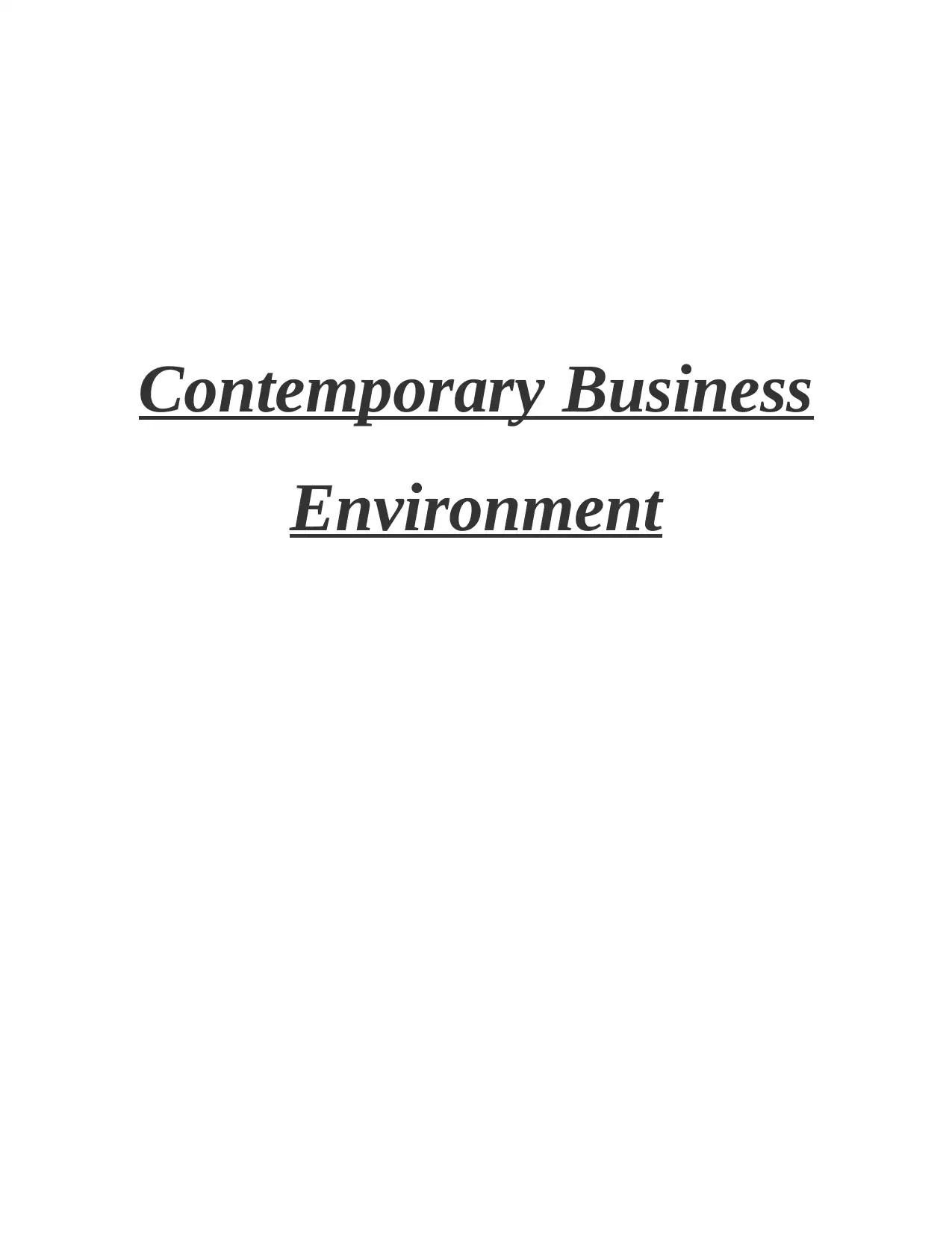
Contemporary Business
Environment
Environment
Paraphrase This Document
Need a fresh take? Get an instant paraphrase of this document with our AI Paraphraser
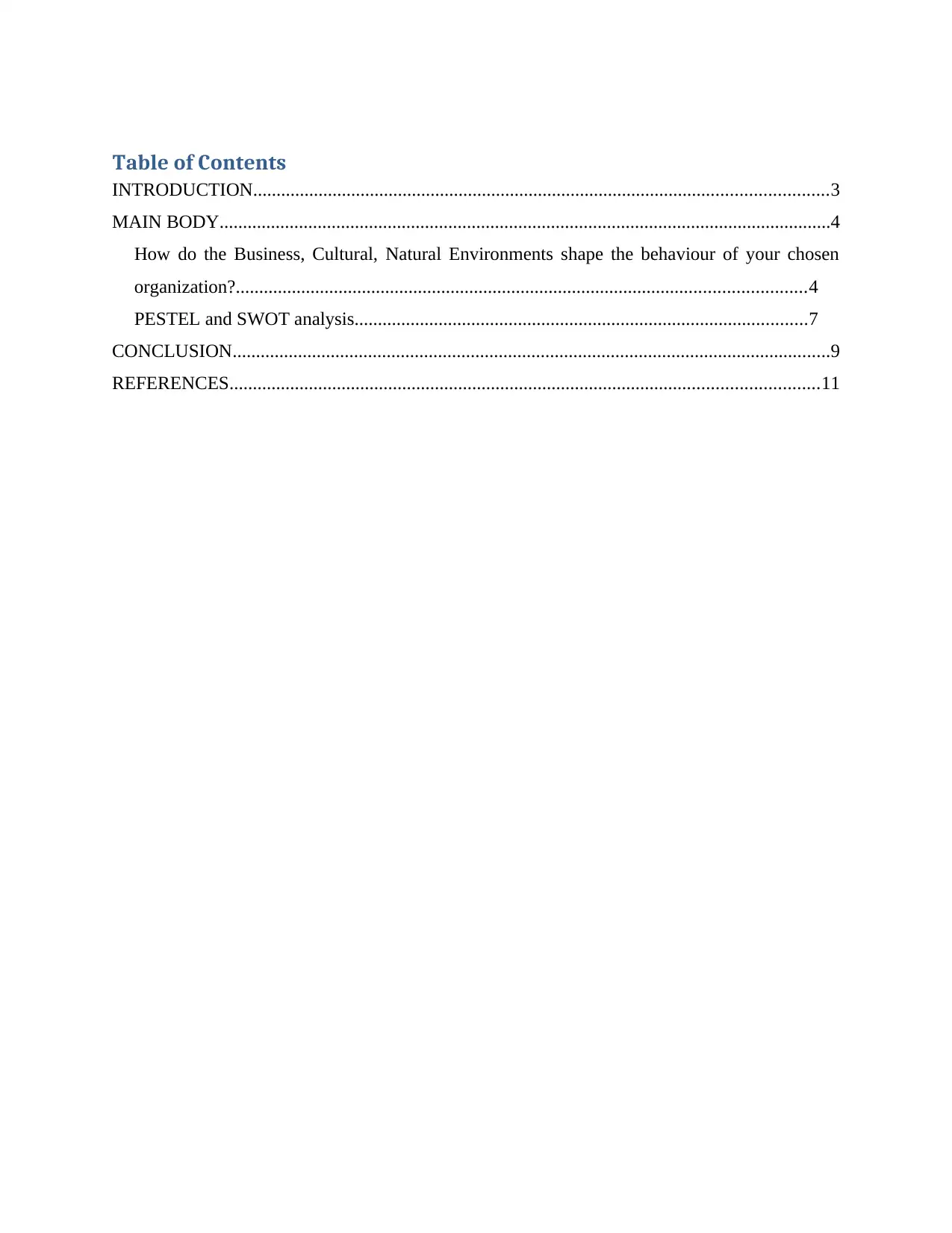
Table of Contents
INTRODUCTION...........................................................................................................................3
MAIN BODY...................................................................................................................................4
How do the Business, Cultural, Natural Environments shape the behaviour of your chosen
organization?..........................................................................................................................4
PESTEL and SWOT analysis.................................................................................................7
CONCLUSION................................................................................................................................9
REFERENCES..............................................................................................................................11
INTRODUCTION...........................................................................................................................3
MAIN BODY...................................................................................................................................4
How do the Business, Cultural, Natural Environments shape the behaviour of your chosen
organization?..........................................................................................................................4
PESTEL and SWOT analysis.................................................................................................7
CONCLUSION................................................................................................................................9
REFERENCES..............................................................................................................................11
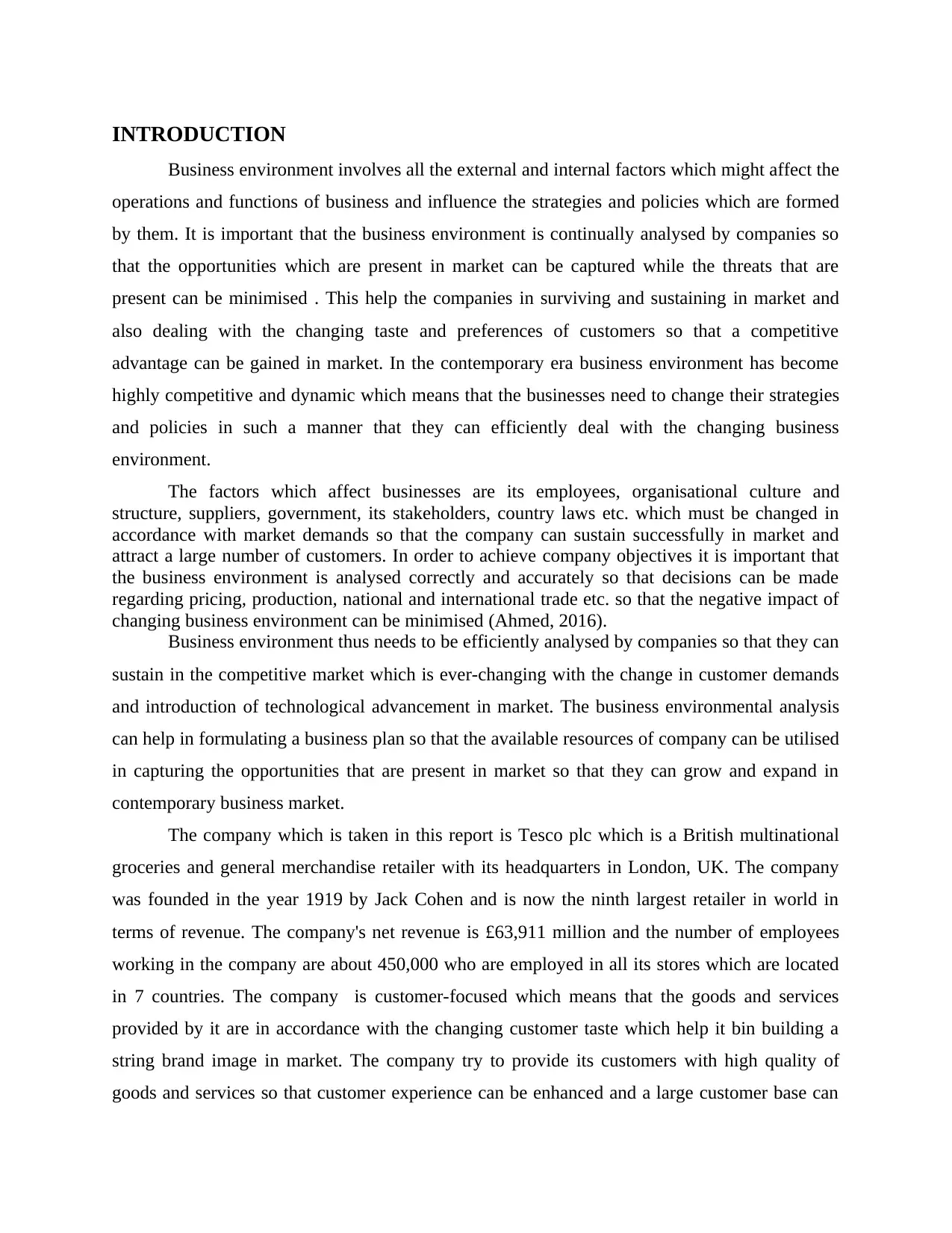
INTRODUCTION
Business environment involves all the external and internal factors which might affect the
operations and functions of business and influence the strategies and policies which are formed
by them. It is important that the business environment is continually analysed by companies so
that the opportunities which are present in market can be captured while the threats that are
present can be minimised . This help the companies in surviving and sustaining in market and
also dealing with the changing taste and preferences of customers so that a competitive
advantage can be gained in market. In the contemporary era business environment has become
highly competitive and dynamic which means that the businesses need to change their strategies
and policies in such a manner that they can efficiently deal with the changing business
environment.
The factors which affect businesses are its employees, organisational culture and
structure, suppliers, government, its stakeholders, country laws etc. which must be changed in
accordance with market demands so that the company can sustain successfully in market and
attract a large number of customers. In order to achieve company objectives it is important that
the business environment is analysed correctly and accurately so that decisions can be made
regarding pricing, production, national and international trade etc. so that the negative impact of
changing business environment can be minimised (Ahmed, 2016).
Business environment thus needs to be efficiently analysed by companies so that they can
sustain in the competitive market which is ever-changing with the change in customer demands
and introduction of technological advancement in market. The business environmental analysis
can help in formulating a business plan so that the available resources of company can be utilised
in capturing the opportunities that are present in market so that they can grow and expand in
contemporary business market.
The company which is taken in this report is Tesco plc which is a British multinational
groceries and general merchandise retailer with its headquarters in London, UK. The company
was founded in the year 1919 by Jack Cohen and is now the ninth largest retailer in world in
terms of revenue. The company's net revenue is £63,911 million and the number of employees
working in the company are about 450,000 who are employed in all its stores which are located
in 7 countries. The company is customer-focused which means that the goods and services
provided by it are in accordance with the changing customer taste which help it bin building a
string brand image in market. The company try to provide its customers with high quality of
goods and services so that customer experience can be enhanced and a large customer base can
Business environment involves all the external and internal factors which might affect the
operations and functions of business and influence the strategies and policies which are formed
by them. It is important that the business environment is continually analysed by companies so
that the opportunities which are present in market can be captured while the threats that are
present can be minimised . This help the companies in surviving and sustaining in market and
also dealing with the changing taste and preferences of customers so that a competitive
advantage can be gained in market. In the contemporary era business environment has become
highly competitive and dynamic which means that the businesses need to change their strategies
and policies in such a manner that they can efficiently deal with the changing business
environment.
The factors which affect businesses are its employees, organisational culture and
structure, suppliers, government, its stakeholders, country laws etc. which must be changed in
accordance with market demands so that the company can sustain successfully in market and
attract a large number of customers. In order to achieve company objectives it is important that
the business environment is analysed correctly and accurately so that decisions can be made
regarding pricing, production, national and international trade etc. so that the negative impact of
changing business environment can be minimised (Ahmed, 2016).
Business environment thus needs to be efficiently analysed by companies so that they can
sustain in the competitive market which is ever-changing with the change in customer demands
and introduction of technological advancement in market. The business environmental analysis
can help in formulating a business plan so that the available resources of company can be utilised
in capturing the opportunities that are present in market so that they can grow and expand in
contemporary business market.
The company which is taken in this report is Tesco plc which is a British multinational
groceries and general merchandise retailer with its headquarters in London, UK. The company
was founded in the year 1919 by Jack Cohen and is now the ninth largest retailer in world in
terms of revenue. The company's net revenue is £63,911 million and the number of employees
working in the company are about 450,000 who are employed in all its stores which are located
in 7 countries. The company is customer-focused which means that the goods and services
provided by it are in accordance with the changing customer taste which help it bin building a
string brand image in market. The company try to provide its customers with high quality of
goods and services so that customer experience can be enhanced and a large customer base can
⊘ This is a preview!⊘
Do you want full access?
Subscribe today to unlock all pages.

Trusted by 1+ million students worldwide
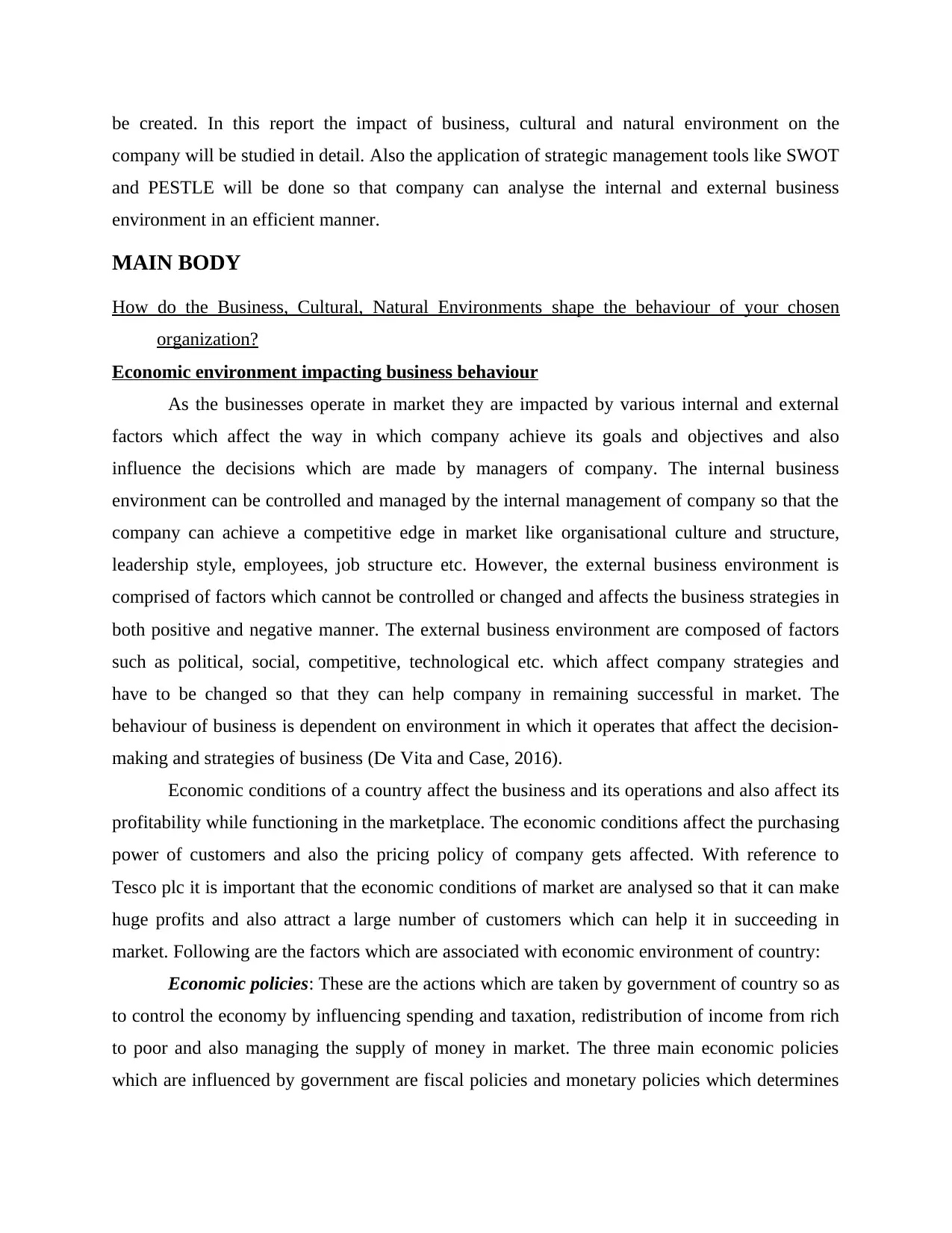
be created. In this report the impact of business, cultural and natural environment on the
company will be studied in detail. Also the application of strategic management tools like SWOT
and PESTLE will be done so that company can analyse the internal and external business
environment in an efficient manner.
MAIN BODY
How do the Business, Cultural, Natural Environments shape the behaviour of your chosen
organization?
Economic environment impacting business behaviour
As the businesses operate in market they are impacted by various internal and external
factors which affect the way in which company achieve its goals and objectives and also
influence the decisions which are made by managers of company. The internal business
environment can be controlled and managed by the internal management of company so that the
company can achieve a competitive edge in market like organisational culture and structure,
leadership style, employees, job structure etc. However, the external business environment is
comprised of factors which cannot be controlled or changed and affects the business strategies in
both positive and negative manner. The external business environment are composed of factors
such as political, social, competitive, technological etc. which affect company strategies and
have to be changed so that they can help company in remaining successful in market. The
behaviour of business is dependent on environment in which it operates that affect the decision-
making and strategies of business (De Vita and Case, 2016).
Economic conditions of a country affect the business and its operations and also affect its
profitability while functioning in the marketplace. The economic conditions affect the purchasing
power of customers and also the pricing policy of company gets affected. With reference to
Tesco plc it is important that the economic conditions of market are analysed so that it can make
huge profits and also attract a large number of customers which can help it in succeeding in
market. Following are the factors which are associated with economic environment of country:
Economic policies: These are the actions which are taken by government of country so as
to control the economy by influencing spending and taxation, redistribution of income from rich
to poor and also managing the supply of money in market. The three main economic policies
which are influenced by government are fiscal policies and monetary policies which determines
company will be studied in detail. Also the application of strategic management tools like SWOT
and PESTLE will be done so that company can analyse the internal and external business
environment in an efficient manner.
MAIN BODY
How do the Business, Cultural, Natural Environments shape the behaviour of your chosen
organization?
Economic environment impacting business behaviour
As the businesses operate in market they are impacted by various internal and external
factors which affect the way in which company achieve its goals and objectives and also
influence the decisions which are made by managers of company. The internal business
environment can be controlled and managed by the internal management of company so that the
company can achieve a competitive edge in market like organisational culture and structure,
leadership style, employees, job structure etc. However, the external business environment is
comprised of factors which cannot be controlled or changed and affects the business strategies in
both positive and negative manner. The external business environment are composed of factors
such as political, social, competitive, technological etc. which affect company strategies and
have to be changed so that they can help company in remaining successful in market. The
behaviour of business is dependent on environment in which it operates that affect the decision-
making and strategies of business (De Vita and Case, 2016).
Economic conditions of a country affect the business and its operations and also affect its
profitability while functioning in the marketplace. The economic conditions affect the purchasing
power of customers and also the pricing policy of company gets affected. With reference to
Tesco plc it is important that the economic conditions of market are analysed so that it can make
huge profits and also attract a large number of customers which can help it in succeeding in
market. Following are the factors which are associated with economic environment of country:
Economic policies: These are the actions which are taken by government of country so as
to control the economy by influencing spending and taxation, redistribution of income from rich
to poor and also managing the supply of money in market. The three main economic policies
which are influenced by government are fiscal policies and monetary policies which determines
Paraphrase This Document
Need a fresh take? Get an instant paraphrase of this document with our AI Paraphraser
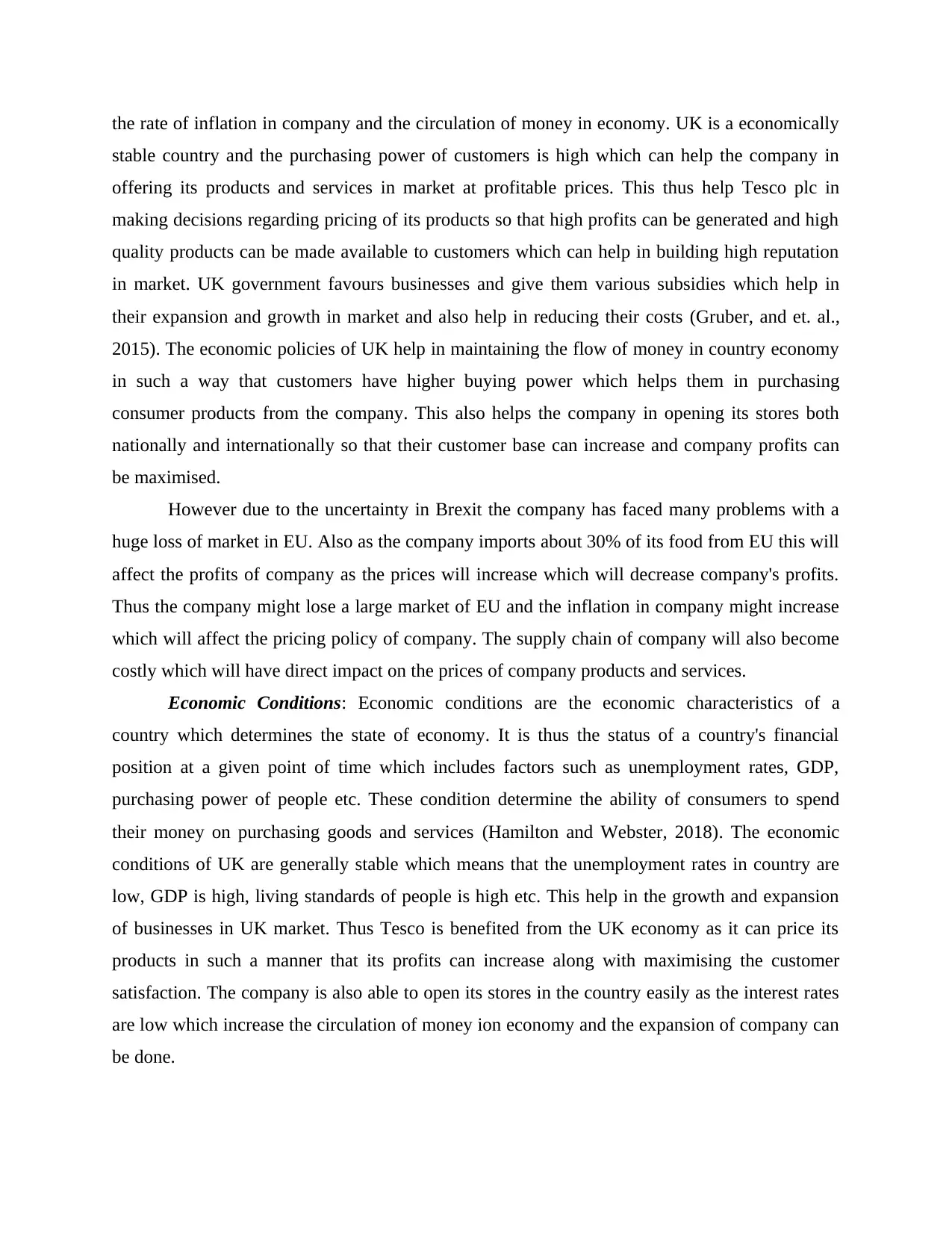
the rate of inflation in company and the circulation of money in economy. UK is a economically
stable country and the purchasing power of customers is high which can help the company in
offering its products and services in market at profitable prices. This thus help Tesco plc in
making decisions regarding pricing of its products so that high profits can be generated and high
quality products can be made available to customers which can help in building high reputation
in market. UK government favours businesses and give them various subsidies which help in
their expansion and growth in market and also help in reducing their costs (Gruber, and et. al.,
2015). The economic policies of UK help in maintaining the flow of money in country economy
in such a way that customers have higher buying power which helps them in purchasing
consumer products from the company. This also helps the company in opening its stores both
nationally and internationally so that their customer base can increase and company profits can
be maximised.
However due to the uncertainty in Brexit the company has faced many problems with a
huge loss of market in EU. Also as the company imports about 30% of its food from EU this will
affect the profits of company as the prices will increase which will decrease company's profits.
Thus the company might lose a large market of EU and the inflation in company might increase
which will affect the pricing policy of company. The supply chain of company will also become
costly which will have direct impact on the prices of company products and services.
Economic Conditions: Economic conditions are the economic characteristics of a
country which determines the state of economy. It is thus the status of a country's financial
position at a given point of time which includes factors such as unemployment rates, GDP,
purchasing power of people etc. These condition determine the ability of consumers to spend
their money on purchasing goods and services (Hamilton and Webster, 2018). The economic
conditions of UK are generally stable which means that the unemployment rates in country are
low, GDP is high, living standards of people is high etc. This help in the growth and expansion
of businesses in UK market. Thus Tesco is benefited from the UK economy as it can price its
products in such a manner that its profits can increase along with maximising the customer
satisfaction. The company is also able to open its stores in the country easily as the interest rates
are low which increase the circulation of money ion economy and the expansion of company can
be done.
stable country and the purchasing power of customers is high which can help the company in
offering its products and services in market at profitable prices. This thus help Tesco plc in
making decisions regarding pricing of its products so that high profits can be generated and high
quality products can be made available to customers which can help in building high reputation
in market. UK government favours businesses and give them various subsidies which help in
their expansion and growth in market and also help in reducing their costs (Gruber, and et. al.,
2015). The economic policies of UK help in maintaining the flow of money in country economy
in such a way that customers have higher buying power which helps them in purchasing
consumer products from the company. This also helps the company in opening its stores both
nationally and internationally so that their customer base can increase and company profits can
be maximised.
However due to the uncertainty in Brexit the company has faced many problems with a
huge loss of market in EU. Also as the company imports about 30% of its food from EU this will
affect the profits of company as the prices will increase which will decrease company's profits.
Thus the company might lose a large market of EU and the inflation in company might increase
which will affect the pricing policy of company. The supply chain of company will also become
costly which will have direct impact on the prices of company products and services.
Economic Conditions: Economic conditions are the economic characteristics of a
country which determines the state of economy. It is thus the status of a country's financial
position at a given point of time which includes factors such as unemployment rates, GDP,
purchasing power of people etc. These condition determine the ability of consumers to spend
their money on purchasing goods and services (Hamilton and Webster, 2018). The economic
conditions of UK are generally stable which means that the unemployment rates in country are
low, GDP is high, living standards of people is high etc. This help in the growth and expansion
of businesses in UK market. Thus Tesco is benefited from the UK economy as it can price its
products in such a manner that its profits can increase along with maximising the customer
satisfaction. The company is also able to open its stores in the country easily as the interest rates
are low which increase the circulation of money ion economy and the expansion of company can
be done.
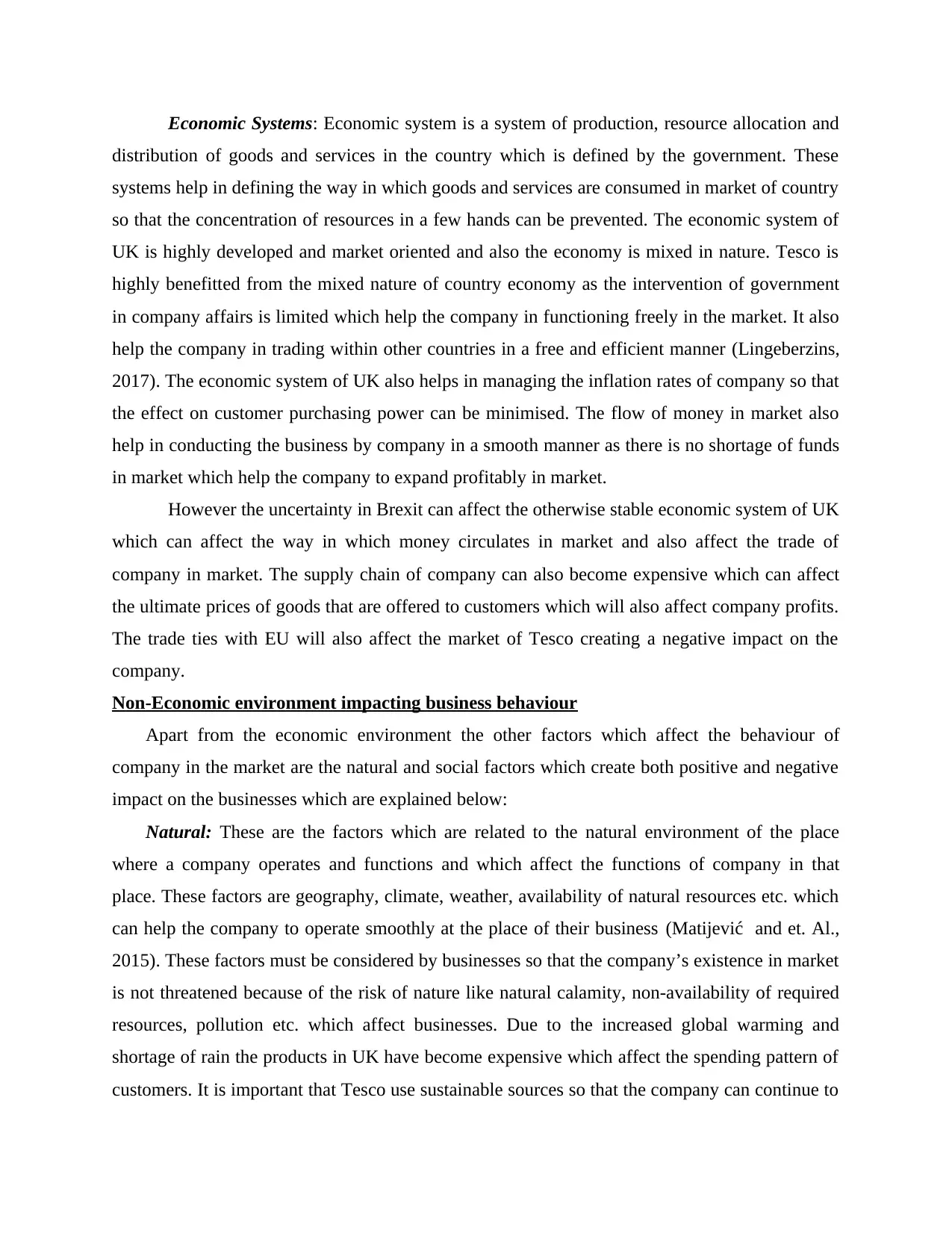
Economic Systems: Economic system is a system of production, resource allocation and
distribution of goods and services in the country which is defined by the government. These
systems help in defining the way in which goods and services are consumed in market of country
so that the concentration of resources in a few hands can be prevented. The economic system of
UK is highly developed and market oriented and also the economy is mixed in nature. Tesco is
highly benefitted from the mixed nature of country economy as the intervention of government
in company affairs is limited which help the company in functioning freely in the market. It also
help the company in trading within other countries in a free and efficient manner (Lingeberzins,
2017). The economic system of UK also helps in managing the inflation rates of company so that
the effect on customer purchasing power can be minimised. The flow of money in market also
help in conducting the business by company in a smooth manner as there is no shortage of funds
in market which help the company to expand profitably in market.
However the uncertainty in Brexit can affect the otherwise stable economic system of UK
which can affect the way in which money circulates in market and also affect the trade of
company in market. The supply chain of company can also become expensive which can affect
the ultimate prices of goods that are offered to customers which will also affect company profits.
The trade ties with EU will also affect the market of Tesco creating a negative impact on the
company.
Non-Economic environment impacting business behaviour
Apart from the economic environment the other factors which affect the behaviour of
company in the market are the natural and social factors which create both positive and negative
impact on the businesses which are explained below:
Natural: These are the factors which are related to the natural environment of the place
where a company operates and functions and which affect the functions of company in that
place. These factors are geography, climate, weather, availability of natural resources etc. which
can help the company to operate smoothly at the place of their business (Matijević and et. Al.,
2015). These factors must be considered by businesses so that the company’s existence in market
is not threatened because of the risk of nature like natural calamity, non-availability of required
resources, pollution etc. which affect businesses. Due to the increased global warming and
shortage of rain the products in UK have become expensive which affect the spending pattern of
customers. It is important that Tesco use sustainable sources so that the company can continue to
distribution of goods and services in the country which is defined by the government. These
systems help in defining the way in which goods and services are consumed in market of country
so that the concentration of resources in a few hands can be prevented. The economic system of
UK is highly developed and market oriented and also the economy is mixed in nature. Tesco is
highly benefitted from the mixed nature of country economy as the intervention of government
in company affairs is limited which help the company in functioning freely in the market. It also
help the company in trading within other countries in a free and efficient manner (Lingeberzins,
2017). The economic system of UK also helps in managing the inflation rates of company so that
the effect on customer purchasing power can be minimised. The flow of money in market also
help in conducting the business by company in a smooth manner as there is no shortage of funds
in market which help the company to expand profitably in market.
However the uncertainty in Brexit can affect the otherwise stable economic system of UK
which can affect the way in which money circulates in market and also affect the trade of
company in market. The supply chain of company can also become expensive which can affect
the ultimate prices of goods that are offered to customers which will also affect company profits.
The trade ties with EU will also affect the market of Tesco creating a negative impact on the
company.
Non-Economic environment impacting business behaviour
Apart from the economic environment the other factors which affect the behaviour of
company in the market are the natural and social factors which create both positive and negative
impact on the businesses which are explained below:
Natural: These are the factors which are related to the natural environment of the place
where a company operates and functions and which affect the functions of company in that
place. These factors are geography, climate, weather, availability of natural resources etc. which
can help the company to operate smoothly at the place of their business (Matijević and et. Al.,
2015). These factors must be considered by businesses so that the company’s existence in market
is not threatened because of the risk of nature like natural calamity, non-availability of required
resources, pollution etc. which affect businesses. Due to the increased global warming and
shortage of rain the products in UK have become expensive which affect the spending pattern of
customers. It is important that Tesco use sustainable sources so that the company can continue to
⊘ This is a preview!⊘
Do you want full access?
Subscribe today to unlock all pages.

Trusted by 1+ million students worldwide
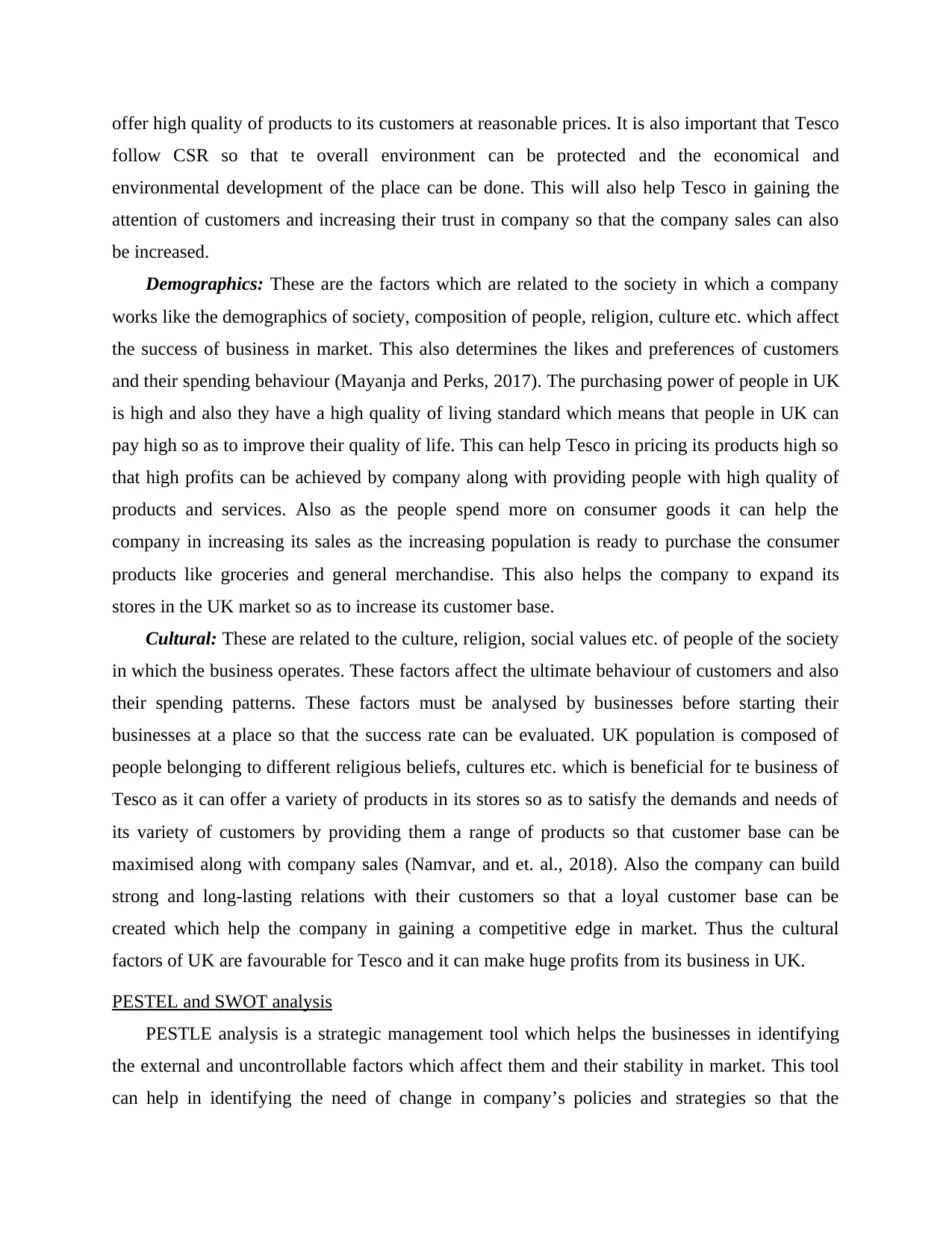
offer high quality of products to its customers at reasonable prices. It is also important that Tesco
follow CSR so that te overall environment can be protected and the economical and
environmental development of the place can be done. This will also help Tesco in gaining the
attention of customers and increasing their trust in company so that the company sales can also
be increased.
Demographics: These are the factors which are related to the society in which a company
works like the demographics of society, composition of people, religion, culture etc. which affect
the success of business in market. This also determines the likes and preferences of customers
and their spending behaviour (Mayanja and Perks, 2017). The purchasing power of people in UK
is high and also they have a high quality of living standard which means that people in UK can
pay high so as to improve their quality of life. This can help Tesco in pricing its products high so
that high profits can be achieved by company along with providing people with high quality of
products and services. Also as the people spend more on consumer goods it can help the
company in increasing its sales as the increasing population is ready to purchase the consumer
products like groceries and general merchandise. This also helps the company to expand its
stores in the UK market so as to increase its customer base.
Cultural: These are related to the culture, religion, social values etc. of people of the society
in which the business operates. These factors affect the ultimate behaviour of customers and also
their spending patterns. These factors must be analysed by businesses before starting their
businesses at a place so that the success rate can be evaluated. UK population is composed of
people belonging to different religious beliefs, cultures etc. which is beneficial for te business of
Tesco as it can offer a variety of products in its stores so as to satisfy the demands and needs of
its variety of customers by providing them a range of products so that customer base can be
maximised along with company sales (Namvar, and et. al., 2018). Also the company can build
strong and long-lasting relations with their customers so that a loyal customer base can be
created which help the company in gaining a competitive edge in market. Thus the cultural
factors of UK are favourable for Tesco and it can make huge profits from its business in UK.
PESTEL and SWOT analysis
PESTLE analysis is a strategic management tool which helps the businesses in identifying
the external and uncontrollable factors which affect them and their stability in market. This tool
can help in identifying the need of change in company’s policies and strategies so that the
follow CSR so that te overall environment can be protected and the economical and
environmental development of the place can be done. This will also help Tesco in gaining the
attention of customers and increasing their trust in company so that the company sales can also
be increased.
Demographics: These are the factors which are related to the society in which a company
works like the demographics of society, composition of people, religion, culture etc. which affect
the success of business in market. This also determines the likes and preferences of customers
and their spending behaviour (Mayanja and Perks, 2017). The purchasing power of people in UK
is high and also they have a high quality of living standard which means that people in UK can
pay high so as to improve their quality of life. This can help Tesco in pricing its products high so
that high profits can be achieved by company along with providing people with high quality of
products and services. Also as the people spend more on consumer goods it can help the
company in increasing its sales as the increasing population is ready to purchase the consumer
products like groceries and general merchandise. This also helps the company to expand its
stores in the UK market so as to increase its customer base.
Cultural: These are related to the culture, religion, social values etc. of people of the society
in which the business operates. These factors affect the ultimate behaviour of customers and also
their spending patterns. These factors must be analysed by businesses before starting their
businesses at a place so that the success rate can be evaluated. UK population is composed of
people belonging to different religious beliefs, cultures etc. which is beneficial for te business of
Tesco as it can offer a variety of products in its stores so as to satisfy the demands and needs of
its variety of customers by providing them a range of products so that customer base can be
maximised along with company sales (Namvar, and et. al., 2018). Also the company can build
strong and long-lasting relations with their customers so that a loyal customer base can be
created which help the company in gaining a competitive edge in market. Thus the cultural
factors of UK are favourable for Tesco and it can make huge profits from its business in UK.
PESTEL and SWOT analysis
PESTLE analysis is a strategic management tool which helps the businesses in identifying
the external and uncontrollable factors which affect them and their stability in market. This tool
can help in identifying the need of change in company’s policies and strategies so that the
Paraphrase This Document
Need a fresh take? Get an instant paraphrase of this document with our AI Paraphraser
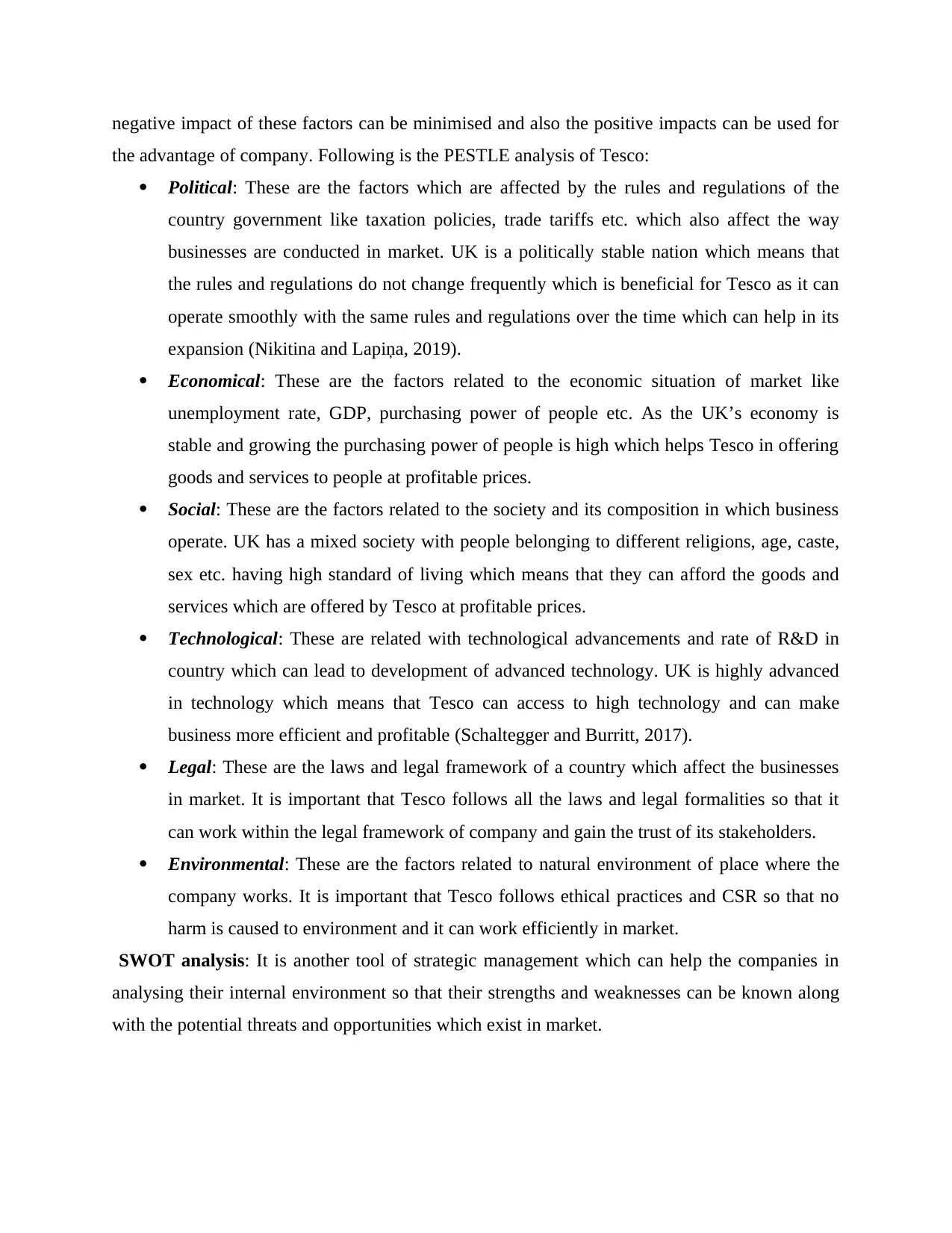
negative impact of these factors can be minimised and also the positive impacts can be used for
the advantage of company. Following is the PESTLE analysis of Tesco:
Political: These are the factors which are affected by the rules and regulations of the
country government like taxation policies, trade tariffs etc. which also affect the way
businesses are conducted in market. UK is a politically stable nation which means that
the rules and regulations do not change frequently which is beneficial for Tesco as it can
operate smoothly with the same rules and regulations over the time which can help in its
expansion (Nikitina and Lapiņa, 2019).
Economical: These are the factors related to the economic situation of market like
unemployment rate, GDP, purchasing power of people etc. As the UK’s economy is
stable and growing the purchasing power of people is high which helps Tesco in offering
goods and services to people at profitable prices.
Social: These are the factors related to the society and its composition in which business
operate. UK has a mixed society with people belonging to different religions, age, caste,
sex etc. having high standard of living which means that they can afford the goods and
services which are offered by Tesco at profitable prices.
Technological: These are related with technological advancements and rate of R&D in
country which can lead to development of advanced technology. UK is highly advanced
in technology which means that Tesco can access to high technology and can make
business more efficient and profitable (Schaltegger and Burritt, 2017).
Legal: These are the laws and legal framework of a country which affect the businesses
in market. It is important that Tesco follows all the laws and legal formalities so that it
can work within the legal framework of company and gain the trust of its stakeholders.
Environmental: These are the factors related to natural environment of place where the
company works. It is important that Tesco follows ethical practices and CSR so that no
harm is caused to environment and it can work efficiently in market.
SWOT analysis: It is another tool of strategic management which can help the companies in
analysing their internal environment so that their strengths and weaknesses can be known along
with the potential threats and opportunities which exist in market.
the advantage of company. Following is the PESTLE analysis of Tesco:
Political: These are the factors which are affected by the rules and regulations of the
country government like taxation policies, trade tariffs etc. which also affect the way
businesses are conducted in market. UK is a politically stable nation which means that
the rules and regulations do not change frequently which is beneficial for Tesco as it can
operate smoothly with the same rules and regulations over the time which can help in its
expansion (Nikitina and Lapiņa, 2019).
Economical: These are the factors related to the economic situation of market like
unemployment rate, GDP, purchasing power of people etc. As the UK’s economy is
stable and growing the purchasing power of people is high which helps Tesco in offering
goods and services to people at profitable prices.
Social: These are the factors related to the society and its composition in which business
operate. UK has a mixed society with people belonging to different religions, age, caste,
sex etc. having high standard of living which means that they can afford the goods and
services which are offered by Tesco at profitable prices.
Technological: These are related with technological advancements and rate of R&D in
country which can lead to development of advanced technology. UK is highly advanced
in technology which means that Tesco can access to high technology and can make
business more efficient and profitable (Schaltegger and Burritt, 2017).
Legal: These are the laws and legal framework of a country which affect the businesses
in market. It is important that Tesco follows all the laws and legal formalities so that it
can work within the legal framework of company and gain the trust of its stakeholders.
Environmental: These are the factors related to natural environment of place where the
company works. It is important that Tesco follows ethical practices and CSR so that no
harm is caused to environment and it can work efficiently in market.
SWOT analysis: It is another tool of strategic management which can help the companies in
analysing their internal environment so that their strengths and weaknesses can be known along
with the potential threats and opportunities which exist in market.
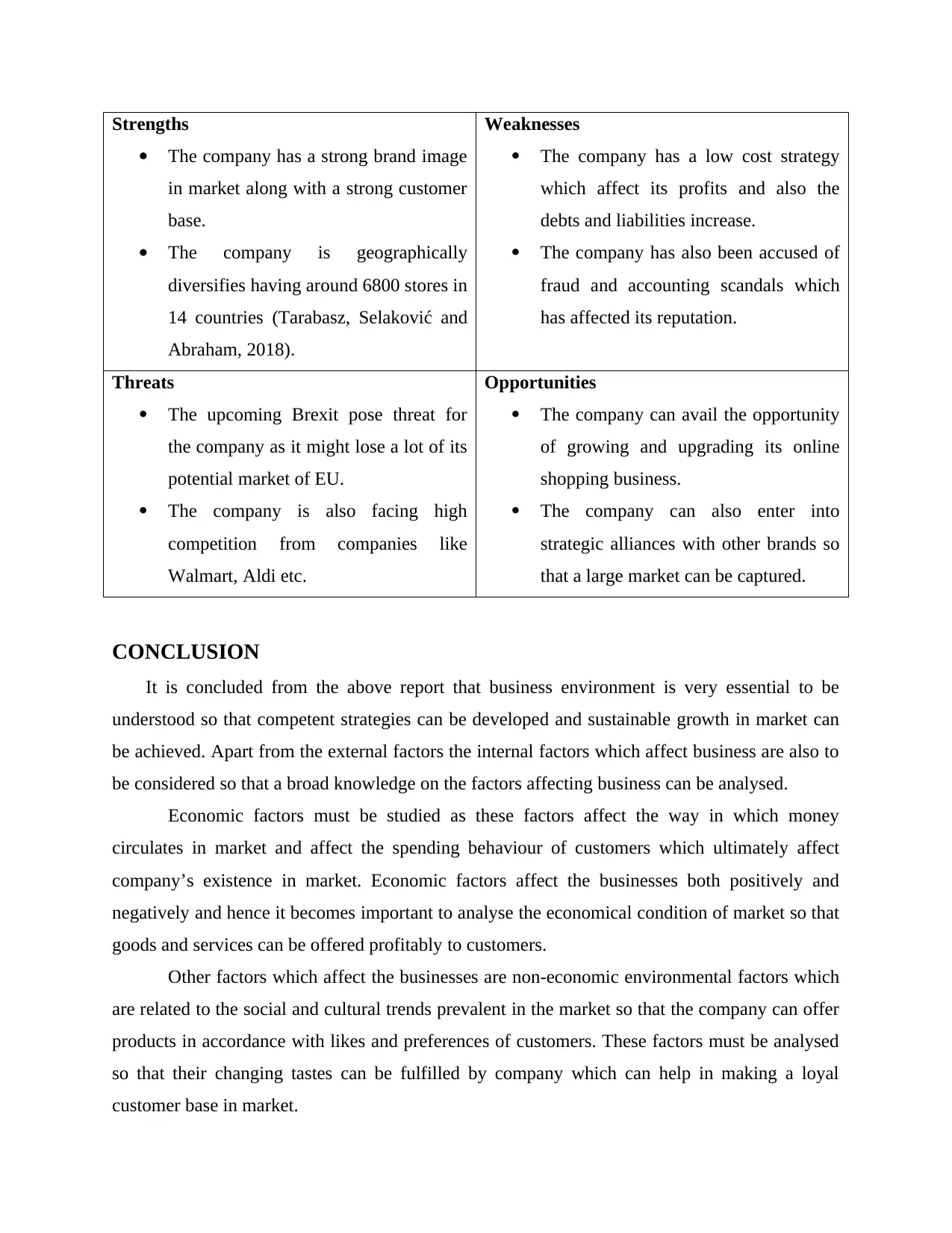
Strengths
The company has a strong brand image
in market along with a strong customer
base.
The company is geographically
diversifies having around 6800 stores in
14 countries (Tarabasz, Selaković and
Abraham, 2018).
Weaknesses
The company has a low cost strategy
which affect its profits and also the
debts and liabilities increase.
The company has also been accused of
fraud and accounting scandals which
has affected its reputation.
Threats
The upcoming Brexit pose threat for
the company as it might lose a lot of its
potential market of EU.
The company is also facing high
competition from companies like
Walmart, Aldi etc.
Opportunities
The company can avail the opportunity
of growing and upgrading its online
shopping business.
The company can also enter into
strategic alliances with other brands so
that a large market can be captured.
CONCLUSION
It is concluded from the above report that business environment is very essential to be
understood so that competent strategies can be developed and sustainable growth in market can
be achieved. Apart from the external factors the internal factors which affect business are also to
be considered so that a broad knowledge on the factors affecting business can be analysed.
Economic factors must be studied as these factors affect the way in which money
circulates in market and affect the spending behaviour of customers which ultimately affect
company’s existence in market. Economic factors affect the businesses both positively and
negatively and hence it becomes important to analyse the economical condition of market so that
goods and services can be offered profitably to customers.
Other factors which affect the businesses are non-economic environmental factors which
are related to the social and cultural trends prevalent in the market so that the company can offer
products in accordance with likes and preferences of customers. These factors must be analysed
so that their changing tastes can be fulfilled by company which can help in making a loyal
customer base in market.
The company has a strong brand image
in market along with a strong customer
base.
The company is geographically
diversifies having around 6800 stores in
14 countries (Tarabasz, Selaković and
Abraham, 2018).
Weaknesses
The company has a low cost strategy
which affect its profits and also the
debts and liabilities increase.
The company has also been accused of
fraud and accounting scandals which
has affected its reputation.
Threats
The upcoming Brexit pose threat for
the company as it might lose a lot of its
potential market of EU.
The company is also facing high
competition from companies like
Walmart, Aldi etc.
Opportunities
The company can avail the opportunity
of growing and upgrading its online
shopping business.
The company can also enter into
strategic alliances with other brands so
that a large market can be captured.
CONCLUSION
It is concluded from the above report that business environment is very essential to be
understood so that competent strategies can be developed and sustainable growth in market can
be achieved. Apart from the external factors the internal factors which affect business are also to
be considered so that a broad knowledge on the factors affecting business can be analysed.
Economic factors must be studied as these factors affect the way in which money
circulates in market and affect the spending behaviour of customers which ultimately affect
company’s existence in market. Economic factors affect the businesses both positively and
negatively and hence it becomes important to analyse the economical condition of market so that
goods and services can be offered profitably to customers.
Other factors which affect the businesses are non-economic environmental factors which
are related to the social and cultural trends prevalent in the market so that the company can offer
products in accordance with likes and preferences of customers. These factors must be analysed
so that their changing tastes can be fulfilled by company which can help in making a loyal
customer base in market.
⊘ This is a preview!⊘
Do you want full access?
Subscribe today to unlock all pages.

Trusted by 1+ million students worldwide
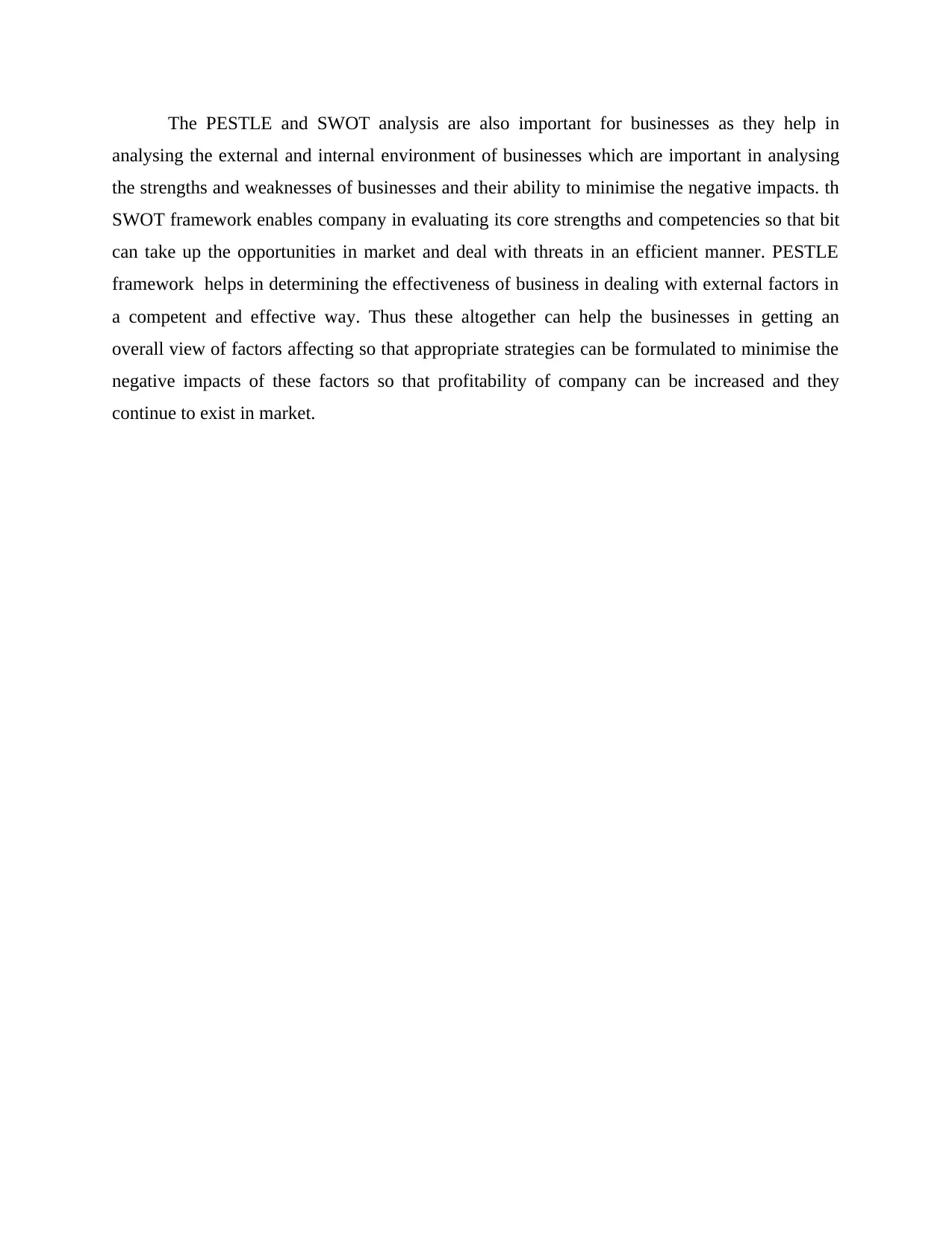
The PESTLE and SWOT analysis are also important for businesses as they help in
analysing the external and internal environment of businesses which are important in analysing
the strengths and weaknesses of businesses and their ability to minimise the negative impacts. th
SWOT framework enables company in evaluating its core strengths and competencies so that bit
can take up the opportunities in market and deal with threats in an efficient manner. PESTLE
framework helps in determining the effectiveness of business in dealing with external factors in
a competent and effective way. Thus these altogether can help the businesses in getting an
overall view of factors affecting so that appropriate strategies can be formulated to minimise the
negative impacts of these factors so that profitability of company can be increased and they
continue to exist in market.
analysing the external and internal environment of businesses which are important in analysing
the strengths and weaknesses of businesses and their ability to minimise the negative impacts. th
SWOT framework enables company in evaluating its core strengths and competencies so that bit
can take up the opportunities in market and deal with threats in an efficient manner. PESTLE
framework helps in determining the effectiveness of business in dealing with external factors in
a competent and effective way. Thus these altogether can help the businesses in getting an
overall view of factors affecting so that appropriate strategies can be formulated to minimise the
negative impacts of these factors so that profitability of company can be increased and they
continue to exist in market.
Paraphrase This Document
Need a fresh take? Get an instant paraphrase of this document with our AI Paraphraser
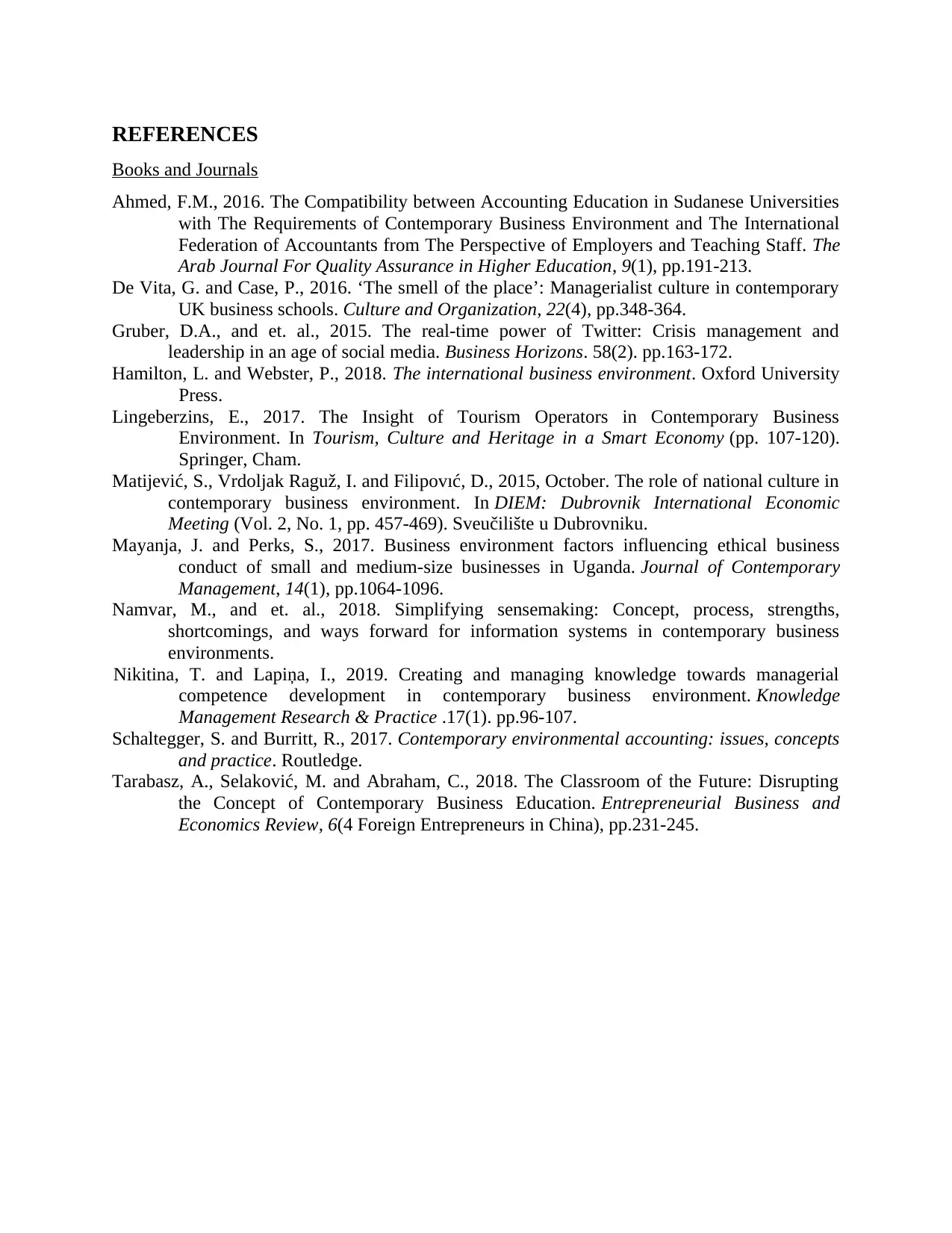
REFERENCES
Books and Journals
Ahmed, F.M., 2016. The Compatibility between Accounting Education in Sudanese Universities
with The Requirements of Contemporary Business Environment and The International
Federation of Accountants from The Perspective of Employers and Teaching Staff. The
Arab Journal For Quality Assurance in Higher Education, 9(1), pp.191-213.
De Vita, G. and Case, P., 2016. ‘The smell of the place’: Managerialist culture in contemporary
UK business schools. Culture and Organization, 22(4), pp.348-364.
Gruber, D.A., and et. al., 2015. The real-time power of Twitter: Crisis management and
leadership in an age of social media. Business Horizons. 58(2). pp.163-172.
Hamilton, L. and Webster, P., 2018. The international business environment. Oxford University
Press.
Lingeberzins, E., 2017. The Insight of Tourism Operators in Contemporary Business
Environment. In Tourism, Culture and Heritage in a Smart Economy (pp. 107-120).
Springer, Cham.
Matijević, S., Vrdoljak Raguž, I. and Filipovıć, D., 2015, October. The role of national culture in
contemporary business environment. In DIEM: Dubrovnik International Economic
Meeting (Vol. 2, No. 1, pp. 457-469). Sveučilište u Dubrovniku.
Mayanja, J. and Perks, S., 2017. Business environment factors influencing ethical business
conduct of small and medium-size businesses in Uganda. Journal of Contemporary
Management, 14(1), pp.1064-1096.
Namvar, M., and et. al., 2018. Simplifying sensemaking: Concept, process, strengths,
shortcomings, and ways forward for information systems in contemporary business
environments.
Nikitina, T. and Lapiņa, I., 2019. Creating and managing knowledge towards managerial
competence development in contemporary business environment. Knowledge
Management Research & Practice .17(1). pp.96-107.
Schaltegger, S. and Burritt, R., 2017. Contemporary environmental accounting: issues, concepts
and practice. Routledge.
Tarabasz, A., Selaković, M. and Abraham, C., 2018. The Classroom of the Future: Disrupting
the Concept of Contemporary Business Education. Entrepreneurial Business and
Economics Review, 6(4 Foreign Entrepreneurs in China), pp.231-245.
Books and Journals
Ahmed, F.M., 2016. The Compatibility between Accounting Education in Sudanese Universities
with The Requirements of Contemporary Business Environment and The International
Federation of Accountants from The Perspective of Employers and Teaching Staff. The
Arab Journal For Quality Assurance in Higher Education, 9(1), pp.191-213.
De Vita, G. and Case, P., 2016. ‘The smell of the place’: Managerialist culture in contemporary
UK business schools. Culture and Organization, 22(4), pp.348-364.
Gruber, D.A., and et. al., 2015. The real-time power of Twitter: Crisis management and
leadership in an age of social media. Business Horizons. 58(2). pp.163-172.
Hamilton, L. and Webster, P., 2018. The international business environment. Oxford University
Press.
Lingeberzins, E., 2017. The Insight of Tourism Operators in Contemporary Business
Environment. In Tourism, Culture and Heritage in a Smart Economy (pp. 107-120).
Springer, Cham.
Matijević, S., Vrdoljak Raguž, I. and Filipovıć, D., 2015, October. The role of national culture in
contemporary business environment. In DIEM: Dubrovnik International Economic
Meeting (Vol. 2, No. 1, pp. 457-469). Sveučilište u Dubrovniku.
Mayanja, J. and Perks, S., 2017. Business environment factors influencing ethical business
conduct of small and medium-size businesses in Uganda. Journal of Contemporary
Management, 14(1), pp.1064-1096.
Namvar, M., and et. al., 2018. Simplifying sensemaking: Concept, process, strengths,
shortcomings, and ways forward for information systems in contemporary business
environments.
Nikitina, T. and Lapiņa, I., 2019. Creating and managing knowledge towards managerial
competence development in contemporary business environment. Knowledge
Management Research & Practice .17(1). pp.96-107.
Schaltegger, S. and Burritt, R., 2017. Contemporary environmental accounting: issues, concepts
and practice. Routledge.
Tarabasz, A., Selaković, M. and Abraham, C., 2018. The Classroom of the Future: Disrupting
the Concept of Contemporary Business Education. Entrepreneurial Business and
Economics Review, 6(4 Foreign Entrepreneurs in China), pp.231-245.
1 out of 11
Related Documents
Your All-in-One AI-Powered Toolkit for Academic Success.
+13062052269
info@desklib.com
Available 24*7 on WhatsApp / Email
![[object Object]](/_next/static/media/star-bottom.7253800d.svg)
Unlock your academic potential
Copyright © 2020–2025 A2Z Services. All Rights Reserved. Developed and managed by ZUCOL.




